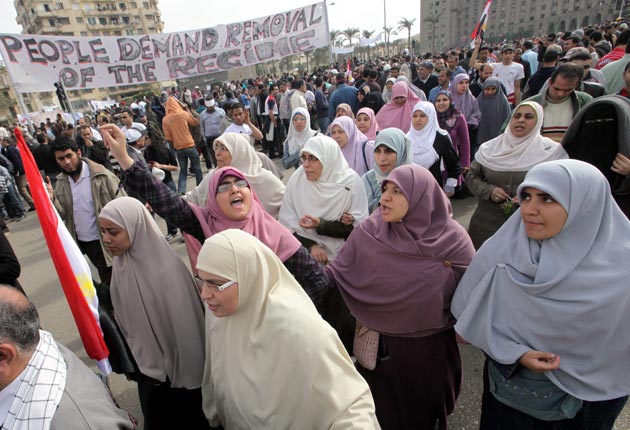Quiet heroines whose courage has helped keep uprising going

Your support helps us to tell the story
From reproductive rights to climate change to Big Tech, The Independent is on the ground when the story is developing. Whether it's investigating the financials of Elon Musk's pro-Trump PAC or producing our latest documentary, 'The A Word', which shines a light on the American women fighting for reproductive rights, we know how important it is to parse out the facts from the messaging.
At such a critical moment in US history, we need reporters on the ground. Your donation allows us to keep sending journalists to speak to both sides of the story.
The Independent is trusted by Americans across the entire political spectrum. And unlike many other quality news outlets, we choose not to lock Americans out of our reporting and analysis with paywalls. We believe quality journalism should be available to everyone, paid for by those who can afford it.
Your support makes all the difference.Asked in Cairo's Tahrir Square if she was scared about what might happen, Mona Seif reflected for a moment before saying yesterday: "You know, I was scared last Thursday night, but once you're here among the people you don't feel scared. I hope I don't die here, but even if I do I'll have spent 10 days here with all these people and felt this is my country, and I have never experienced that before."
If this is a revolution, then 24-year-old Ms Seif is one of its quiet heroes. A post-graduate student in cancer biology at Cairo University, she is one of the leading figures who used blogs and Twitter to help spread the call for the first protest on 25 January.
Protest runs in her family: her father is a well-known human rights lawyer, Ahmed Seif el-Islam, who was serving in a Mubarak jail when she was born and is among more than 20 lawyers who have been arrested.
When Egypt cut the internet last week, she was one of 20 activists who took their laptops to a private house and started the "Twitter Centre of the Revolution", getting messages to the outside world thanks to one of their number being connected to an ISP which Egypt did not initially shut down because it almost exclusively serves financial services. "I use Facebook, and I have a blog but Twitter is my favourite tool for political issues," she says.
Ms Seif believes that the immediate catalysts for the escalating protests were the death of Khaled Said – the young man allegedly beaten to death by secret police in Alexandria last year – the uprising in Tunisia, and "the build-up over years of all the small scale strikes and protests".
She pays tribute to the still-unknown creators of the "We are all Khaled Said" Facebook page.
But while she never imagined it would grow to this, what kept her going as the protest day approached was the memory of another demonstration she had taken part in last year. Her group managed to elude the police by not coming to Tahrir Square but another street downtown. A march of around 50 rapidly grew to around 1,000 before the police crushed it with some brutality. "For maybe 35 minutes we felt that the street was ours, which was incredible."
What outcome does she hope for? "I want Mubarak to leave and the regime to fall. Then a transitional government, which will hold proper democratic elections and whoever wins I will accept it."
Another woman from a very different background is also surprised to be taking part in such a huge protest. Middle-aged single mother, Safa Hamis Mohammed, has had trouble making ends meet as a home Koran teacher after losing her journalism job 17 years ago. But after Wednesday's attack on the square by pro-Mubarak supporters, she found herself carrying stones to be thrown by those defending it. Would she vote for the Muslim Brotherhood? "We didn't know about them from Egyptian television and I respect them for being here and because they are Muslims. I will think about it."
Gigi Ibrahim, 22, a secular US-educated politics major at The American University in Cairo, will not be casting her vote for the Brotherhood. The self-described "revolutionary socialist" says she has had continuous arguments with her upper middle class family – and especially her garment factory owner father – about the protests.
Region in turmoil: The day's other protests
Jordan
Hundreds of Jordanians protested in Amman yesterday, pictured, chanting "down with the government" and rallying against the new prime minister, who was named just days earlier as King Abdullah moved to stem the spread of discontent and protests over rising food prices.
Algeria
Opposition groups have said they will go ahead with protests planned for next week, despite President Abdelaziz Bouteflika's announcement on Thursday that he would lift the controversial state of emergency that has been in effect for 19 years. Protesters are angry at both his long rule and economic woes.
Sudan
Police fired tear gas at about 200 students yesterday as they tried to rally outside a university in Sennar state. It was the latest in a series of short-lived demonstrations against political repression and human rights abuses which have been broken up by the authorities.
Syria
Plainclothes security forces were deployed on the streets of Damascus after an internet campaign calling for a "Day of Rage" yesterday in Syria. But there were few signs that people were heeding the call in a nation which suppresses all dissenting voices.
Join our commenting forum
Join thought-provoking conversations, follow other Independent readers and see their replies
Comments